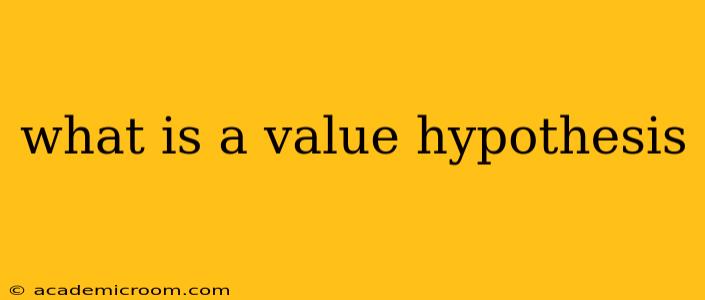A value hypothesis is a testable statement that outlines the value a product or service offers to its target customers and why they would choose it over alternatives. It's a crucial component of the Lean Startup methodology, guiding product development and ensuring resources are focused on building something people actually want. Instead of relying on assumptions, a value hypothesis forces you to articulate and validate the core value proposition.
Think of it as an educated guess about what problem your product solves and how it solves it better than the competition. It's not a prediction of market size or revenue; rather, it's a focused statement on the value exchange between your product and the customer.
What Makes a Strong Value Hypothesis?
A good value hypothesis is:
- Specific: Avoid vague statements. Clearly define the target customer segment, the problem being solved, and the proposed solution.
- Testable: It must be possible to gather data to prove or disprove the hypothesis. This often involves conducting user research, A/B testing, or market analysis.
- Measurable: Identify key metrics that will demonstrate the success or failure of the hypothesis. These could include conversion rates, customer satisfaction scores, or user engagement metrics.
- Time-bound: Establish a timeframe for testing and validation. This prevents the hypothesis from becoming a stagnant assumption.
How to Formulate a Value Hypothesis
A common framework is:
"For [target customer segment], who [need or problem], [product/service] is a [product category] that [value proposition] unlike [competitors] because [key differentiator]."
Example:
"For busy professionals who need to manage multiple projects efficiently, Asana is a project management tool that simplifies collaboration and improves team productivity unlike Trello because it offers advanced features for larger teams and complex workflows."
What are the Key Components of a Value Hypothesis?
Let's break down the crucial parts:
1. Target Customer Segment: Who are you building this for?
Defining your ideal customer is paramount. Don't just say "everyone." Be specific about demographics, psychographics, needs, and pain points.
2. Need or Problem: What problem does your product solve?
Clearly articulate the pain point your product addresses. The more specific you are, the better you can target your validation efforts.
3. Product/Service: What are you offering?
Briefly describe your product or service.
4. Product Category: How do you categorize your offering?
This helps to place your product within the competitive landscape.
5. Value Proposition: What benefit does the customer receive?
This is the core of your hypothesis – what unique value does your product provide?
6. Competitors: Who are your main competitors?
Understanding the competitive landscape helps to define your unique selling points.
7. Key Differentiator: What makes your product different and better?
This is your unique selling proposition (USP) - the reason customers should choose you over the competition.
How to Test a Value Hypothesis
Testing your value hypothesis is crucial. Methods include:
- Customer interviews: Gather direct feedback from potential customers.
- Surveys: Collect quantitative and qualitative data from a larger audience.
- A/B testing: Compare different versions of your product or messaging.
- Landing page tests: Measure conversion rates to gauge interest and engagement.
- Minimum Viable Product (MVP) launch: Release a basic version of your product to gather real-world feedback.
Frequently Asked Questions
What's the difference between a value hypothesis and a business hypothesis?
A business hypothesis focuses on the overall business model's viability, encompassing aspects like market size, revenue streams, and profitability. A value hypothesis is more granular, concentrating solely on the value proposition and customer validation.
How is a value hypothesis related to the Lean Canvas?
The value hypothesis directly informs the problem, solution, and unique value proposition sections of the Lean Canvas, providing a concrete foundation for the entire business model.
Can I have multiple value hypotheses?
Yes, particularly if you're targeting multiple customer segments or offering multiple features within your product. Each hypothesis should be tested individually.
By rigorously developing and testing your value hypothesis, you greatly increase the probability of building a successful product that resonates with your target market and delivers real value. Remember, it's an iterative process – expect to refine and adjust your hypothesis based on your findings.
